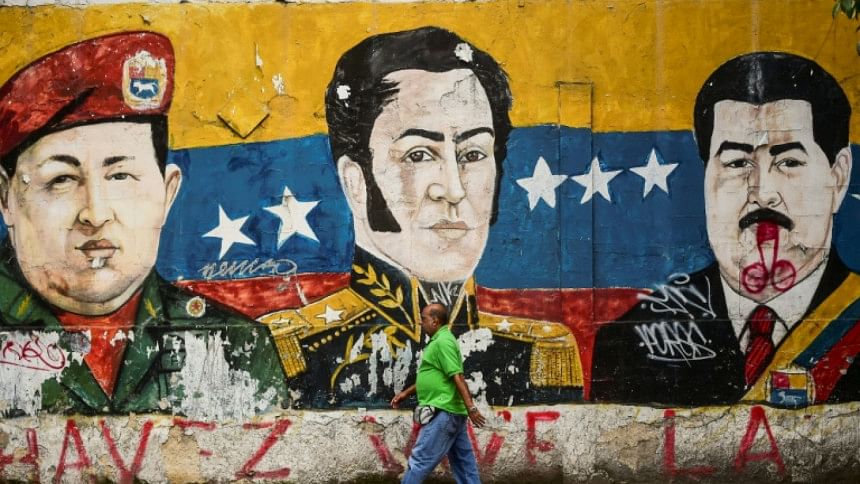Venezuela arrests two top opposition leaders

The Venezuelan intelligence service arrested two prominent opposition leaders early Tuesday, their relatives said, a day after a vote to choose a much-condemned assembly that supersedes parliament.
Leopoldo Lopez and Antonio Ledezma were both already under house arrest when they were picked up by the intelligence service known by its in acronym Sebin, the wife of Lopez and children of Ledezma said separately.
The two men are Venezuela's most high profile opposition leaders. Both had called for a boycott of Sunday's vote for a so-called and all-powerful constituent assembly tasked with rewriting the constitution.
Both of their families said they held President Nicolas Maduro, the driving force behind the vote, responsible for the leaders' lives.
"They just took Leopoldo away. We do not know where he is or where they are taking him," Lopez's wife Lilian Tintori said on Twitter.
She released home security camera footage in which four uniformed police officers and three in civilian garb are seen putting her husband into a Sebin car and take off, with other cars escorting them.
The children of Ledezma -- named Victor, Vanessa and Antonietta -- also said on Twitter that the Sebin had taken away their father.
Opposition leaders and local media posted cellphone footage of Ledezma being taken away from his home forcibly while still wearing pajamas.
Lopez, 46, was transferred to house arrest in July of this year after serving three years and five months in prison as part of a 14-year term. He had been convicted of instigating violence during protests against Maduro in 2014 that left 43 people dead.
Ledezma, 62, was arrested in February 2015 on charges of conspiracy and racketeering and was placed under house arrest three months later for health reasons.
Opposition lawmaker Freddy Guevara said the arrests were aimed at "frightening us and demoralizing us."
Four months of street demonstrations against Maduro have left 120 people dead, including 10 over the weekend that included the election.
The opposition says the vote was a fraudulent ploy by Maduro to cling to power because, it argues, he is so unpopular he could not win an election. The next one is scheduled for 2018.
The new constituent assembly is to start working on Wednesday. It is made up only of members of Maduro's Socialist party. The opposition has called a big rally for that day.
'Imperial orders'
The United States hit Maduro with direct sanctions on Monday over the weekend vote, calling him a "dictator," while the leader refused to heed what he slammed as "imperial orders."
The measures were unusual in that they targeted a sitting head of state, but their reach was mostly symbolic, freezing any US assets Maduro might have and banning people under US jurisdiction from dealing with him.
"Yesterday's illegitimate elections confirm that Maduro is a dictator who disregards the will of the Venezuelan people," US Treasury Secretary Steven Mnuchin told reporters.
Maduro lashed out at the move, saying it smacked of American imperialism.
"I will not obey imperial orders," he said.
Colombia, Mexico, Peru and other nations joined the US in saying they did not recognize the results of Sunday's election, which appointed a new "Constituent Assembly" superseding Venezuela's legislative body, the opposition-controlled National Assembly.
Maduro's own attorney general, Luisa Ortega -- who broke with him months ago over his policies -- also said she would not acknowledge the body, calling it part of the president's "dictatorial ambition."
However, old allies Bolivia, Cuba, Nicaragua and Russia stood by Maduro, who shrugged off mass protests and a previous round of US sanctions on some of his officials to see through the election.
The National Electoral Council claimed more than 40 percent of Venezuela's 20 million voters had cast ballots Sunday.
According to the opposition, voter turnout was closer to 12 percent, a figure more aligned with the lack of lines at many polling stations.
Surveys by polling firm Datanalisis showed more than 70 percent of Venezuelans opposed the new assembly.
Venezuela's 30 million citizens are suffering through an acute economic crisis marked by shortages of basic goods.
Sanctions against the all-important oil sector would worsen their situation, but could also destabilize the government, which is frenziedly printing money and running out of foreign currency reserves.

 For all latest news, follow The Daily Star's Google News channel.
For all latest news, follow The Daily Star's Google News channel. 




Comments